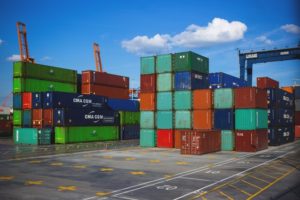HOW DOES INTERNATIONAL SHIPPING WORK?

It is no secret that most businesses start locally. However, if the company performs well, expanding it to the international market is just a matter of time. Moreover, many companies today are looking for ways to reach a global audience and earn more profits due to globalization. One surefire way to expand your business is by transporting goods via international shipping.
Simply put, international shipping refers to the process of transporting goods or services between different countries via air, water, or ground.
If you are new to international shipping, this entire process might seem overwhelming and tricky. You might be wondering how it works? What factors do you need to consider for shipment? And what are the best strategies you must adopt to maximize the possibility of international expansion success?
So check out the below article and learn how to get started with the international shipping process. Usually, the international shipping process comprises the following seven stages:
- Export haulage
The first step involves transporting goods/items to the forwarder’s warehouse from the shipper’s destination. The method of transportation, whether by truck, rail, or a mix of the two, is dependent on two key factors: the products getting shipped and the agreement with the consignee. Nevertheless, it would take a few hours to a few days for the cargo to reach the warehouse.
Moreover, if the shipper is accountable for this part of transportation, the local transportation company may conduct all the arrangements. However, working with a freight forwarding company makes the most sense if the consignee is responsible.
- Export customs clearance
Before shipping the cargo to another country, it must clear all the customs requirements. Therefore, businesses willing to ship their goods internationally must submit valid documentation to the customs authorities and ensure their transportation abides by shipping laws and duties. For this reason, you can seek help from a customs brokerage firm that holds valid licenses and specializes in their field. These experts are meticulous and detail-oriented. They can help your business fill out the proper formal documents and ensure on your behalf that your shipment complies with licensing laws, taxes, and duties.
Be mindful that most delays in international shipments occur at this stage. So if you don’t wish to disappoint your end customers, especially those who paid you a premium price for quick delivery, you must ensure your shipment passes the custom process fastly and efficiently.
- Origin handling
This step involves the handling and inspection of the cargo. The primary reason for origin handling is to ensure that the goods arrive and leave in the same condition. Usually, freight forwarding companies are responsible for this task. In simpler words, freight forwarders inspect and make a report from the time they receive the goods until loading them onto the ship. They also need to share the reports or findings with the relevant shipper.
Afterward, you need to determine the next step of the plan, like what will be the means of transport or whether it needs consolidating or not.
- Freight
Once your cargo has passed customs, here comes the actual part – transportation of shipment from the origin to destination. The freight forwarder needs to determine the transportation mode, such as air or ocean, depending on the shipment requirements. It is relevant to note that the shipper and consignee decide who will be paying for ocean or air freight charges.
- Import customs clearance
After your freight has successfully reached the border of the importing country, you need to pass another clearance – import customs clearance. This step is equally critical as export customs clearance. The destination country has its own law and regulations regarding shipments. Therefore, your load will remain at the destination warehouse until the import customs check the relevant documents and establish a declaration. Like the export customs clearance, you can appoint a customs broker to help you pass this clearance.
- Destination handling
Before releasing your goods to the consignee, the cargo needs to be handled at the destination. This stage – destination handling, refers to transporting your goods from the port to the destination warehouse. The step involves unloading and unstuffing the container and preparing the shipment for the consignee to collect.
Initially, the freight forwarder is in charge of collecting the container and payment since goods can’t leave the destination warehouse before the payment. Later, the freight forwarder can pass on this payment to either the consignee or the shipper.
- Import haulage
Haulage is the final stage of your international shipping process. In this step, the product will reach the consignee’s address. For this stage, there are two cases. First, the freight forwarder delivers the cargo to the final given address by themselves. Or the second in which the freight forwarder may enlist a local transport company to take care of this task.
Tips For International Shipping
Before starting with your international shipping process, it would be best to pay attention to the following top tips:
- Learn customs laws and regulations
Shipments need to pass through customs authority to travel internationally. Since the laws and regulations differ from country to country, you must learn the rules of the origin and destination countries. Not doing so may result in a fine, delay, or even confiscation of your goods.
- Research customers’ demands
Entering a new market is no walk in the park. Before committing to international trading, you need to determine whether there is a demand for your products/services abroad. You must also be aware of your competitors where you plan to market your products internationally and the financial viability.
- Select the correct shipping service
Unfortunately, scams are not uncommon in international shipping. So be careful when choosing an international shipping service for your business. The right shipping company can help you break into the global market more efficiently and save you from many headaches. If you’re about to ship stuff like luggage and boxes, it is best to find a company who specializes in luggage shipment. While choosing the luggage shipping company, consider a few factors such as shipping costs, delivery times, tracking services, etc. If you’ll also be shipping on a regular basis, it might be a good idea to find shipping containers for sale and purchase one or two that you can use.
- Choose product packaging wisely
Your goods will travel long distances, and there will be loading and unloading of the shipment onto different vehicles. So make sure to pack your products wisely. After all, you don’t wish to ship your products broken or damaged to your potential customers’ final destination.
Conclusion
Since there is an increasing demand for online stores and e-commerce today, more and more businesses are inclining towards international shipping to meet their customers’ needs, boost brand visibility, and increase revenue. So if you wish to take your business to the next level of success, consider trading on the international level. However, the process of international shipping isn’t easy. You need to have proper documents to pass customs clearance and in-depth knowledge of shipping laws, regulations, and procedures.






